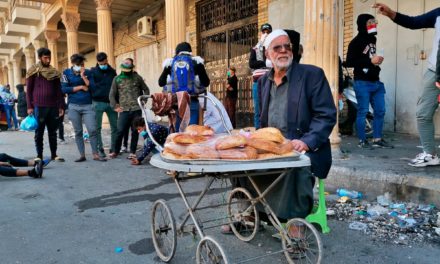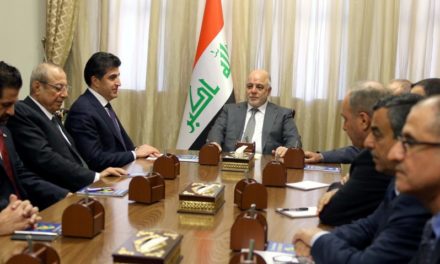While many focus on Iraq’s political and security achievements over the last four years, Iraq has achieved significant economic progress, specifically in its energy sector. This has reasserted Iraq’s role as one of the biggest energy producers in the world. This article is a summary of steps Iraq has taken in 2014 to improve its energy sector.
Plan to improve the oil sector
Iraq was able to double its production of crude oil after tough negotiations with OPEC, which led to a historical agreement that allowed the increase of Iraq’s export share in the international oil market. This was accompanied with a gradual rise in oil prices starting from $34 per barrel in 2016 to $65 and $70 between 2017 and 2018, staying relatively stable at those prices. This led to a surplus of more than $10 per barrel of crude oil, higher than what was estimated in the 2017 federal budget.
Furthermore, the Iraqi government worked hard on increasing investment in Iraq’s oil sector through the development of the already discovered oil fields and the exploration of new fields. For instance, the Iraqi government recently signed a contract to develop Kirkuk’s oil fields with BP, which is regarded as one of the richest oil fields in the Middle East, competing in importance with the oil fields of Basra. If these fields are developed effectively, they will be able to cause a vital upgrade to Iraq’s economic situation and double its oil production. Add to it the fifth oil bidding round which introduced advanced service contract models that secured higher financial returns for Iraq. In that round eleven oil fields were put forward for investment, with six contracts signed in the first phase, and the rest are supposed to be signed in the second phase of bidding.
The government also instructed Iraq’s oil companies to increase their production. The table below shows precisely how this has gradually happened.


In addition, some improvement to the infrastructure of Iraq’s main ports used to export oil products took place that was in line with the increase of Iraq’s oil and gas production policy. Last but not least, there were some critical upgrades to Iraq’s oil storage facilities as well as the creation of new strategic ones.
The advent of Iraq’s gas sector
Iraq not only worked hard in the last four years on improving and attracting investment to its oil sector, but also bootstrapped its gas industry for the first time in Iraq’s history in 2016. After the production of “Seybe” as the first stand-alone investment gas field started, it allowed Iraq to join the ranks of nations exporting gas in its different products.
In this regard, Iraq’s strategy was twofold: on the one hand it followed a policy of attracting investment to discover and develop the gas sector as a first step to launch the gas sector in Iraq. On the other hand it was created later so that facilities can sweeten the gas, to obtain gas empty of H2S and CO2, and after that drying it to get to the allowed H2O levels. One instance is the wet gas processing unit which was created in the sixth gas extraction plant in West Qurna/1 field, with a capacity of 50,000 barrels a day to convey it through pipelines and later process the gas to obtain liquid petroleum gas (LPG). Its export reached 143,000 tons of liquid gas in 2017, and 73,000 tons in the first quarter of 2018.
The focus of the Iraqi government to produce C5 condensers which reached in this year’s first quarter nine shipments and 188,838 cubic meters is also regarded as a smart move by Iraq in this sector because of the high economic value of this product and the high global demand for it. It is worth mentioning that the condenser export started in 2016.
Iraq also entered the natural gas liquids (NGL) market by creating the first comprehensive project in its history to liquify gas in the field of Nasiriyah and Gharraf with the capacity of 200 MSCF which works on gas.
The investment in the accompanying gas is the second part of the strategy adopted by the Iraqi government in the gas sector based on the initial estimations of the Iraqi Ministry of Oil. Iraq has a 132 trillion cubic meter gas reserve, 70% of which is accompanying gas. The government had announced a plan to invest all the accompanying gas by 2020. About 80% of all accompanying gas of many oil fields in Basra has been an investment. This will help in reducing the depletion of Iraq’s oil resources by replaying it with gas products, which is considered a relatively clean fuel for factories and power stations.
The positive consequences of this will be the reduction of local oil consumption and hence the reduction in pollution caused by it at one side, and the increase of Iraqi oil exports on the other hand. The gas processing plant in Barzargan field with a 71 million cubic meters per day capacity is one of the necessary steps taken in this regard.
Iraq’s national pipeline network
The Iraqi government announced the creation of several pipeline projects, most importantly the pipeline between Baiji and Fishkhabor which transports crude oil from Kirkuk’s oil fields to Turkey’s Ceyhan port. The pipeline is about 350km long and with a diameter of 48 nodes, able to transport one million barrels per day.
The establishment of Iraq’s National Oil Company
To legally protect its progress, Iraq established the Iraqi National Oil Company. This step reflects Iraq’s political will to develop this sector strategically and regulate its impact on the economy. It also gives Iraq a better position in setting international prices and improve its status in OPEC where all members have their own national oil companies. This step also has legal importance because it helps in protecting the Iraqi assets in case of legal disputes. Technically, this step enables Iraq to oversee foreign investments in a technically and financially improved manner and facilitate the transfer of oil technology to Iraq.
Iraq deserves to complete these strategic achievements which have boosted its impact in the global energy markets and returned the investors’ trust in its economy by forming a competent government that continues these significant achievements.

Youssef Ali
Youssef Ali is a Ph.D researcher in international law. He specializes in international oil and gas law and is interested in Iraqi political and legal affairs.










